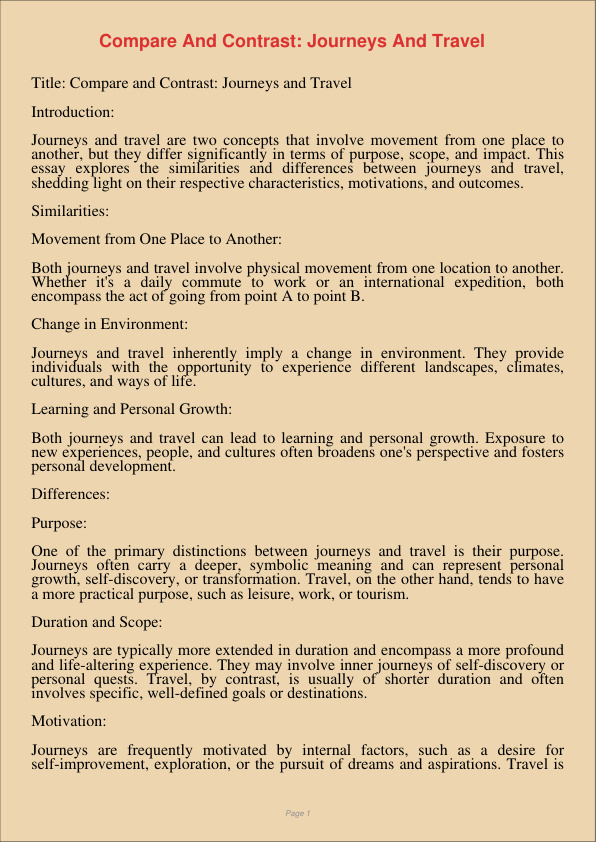Compare And Contrast Journeys And Travel
Jan 9, 2024
travel
journeys
Sociology
History

Title: Compare and Contrast: Journeys and Travel
Introduction:
Journeys and travel are two concepts that involve movement from one place to another, but they differ significantly in terms of purpose, scope, and impact. This essay explores the similarities and differences between journeys and travel, shedding light on their respective characteristics, motivations, and outcomes.
Similarities:
Movement from One Place to Another:
Both journeys and travel involve physical movement from one location to another. Whether it’s a daily commute to work or an international expedition, both encompass the act of going from point A to point B.
Change in Environment:
Journeys and travel inherently imply a change in environment. They provide individuals with the opportunity to experience different landscapes, climates, cultures, and ways of life.
Learning and Personal Growth:
Both journeys and travel can lead to learning and personal growth. Exposure to new experiences, people, and cultures often broadens one’s perspective and fosters personal development.
Differences:
Purpose:
One of the primary distinctions between journeys and travel is their purpose. Journeys often carry a deeper, symbolic meaning and can represent personal growth, self-discovery, or transformation. Travel, on the other hand, tends to have a more practical purpose, such as leisure, work, or tourism.
Duration and Scope:
Journeys are typically more extended in duration and encompass a more profound and life-altering experience. They may involve inner journeys of self-discovery or personal quests. Travel, by contrast, is usually of shorter duration and often involves specific, well-defined goals or destinations.
Motivation:
Journeys are frequently motivated by internal factors, such as a desire for self-improvement, exploration, or the pursuit of dreams and aspirations. Travel is often driven by external factors, such as a job assignment, a vacation, or a specific event or purpose, such as visiting friends or family.
Outcomes:
The outcomes of journeys and travel can differ significantly. Journeys often result in personal transformation, increased self-awareness, and a sense of achievement. Travel may lead to relaxation, recreation, new experiences, or professional opportunities, but it may not necessarily result in profound personal growth.
Cultural Interaction:
Travel frequently involves interaction with new cultures and societies, often in a more superficial or touristic manner. Journeys, on the other hand, may delve deeper into cultural immersion, fostering a greater understanding of different ways of life and beliefs.
Conclusion:
Journeys and travel are both forms of movement, but they differ in terms of purpose, duration, motivation, and outcomes. Journeys often involve a more profound internal exploration, while travel tends to be more goal-oriented and externally motivated. Both concepts offer unique opportunities for learning, personal growth, and exposure to new environments and cultures, enriching the human experience in distinct ways. Whether embarking on a journey of self-discovery or traveling to a new destination, both experiences have their own value and significance.